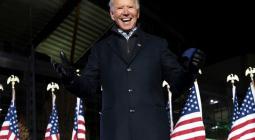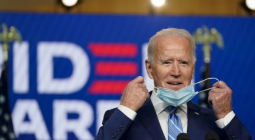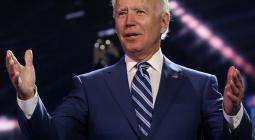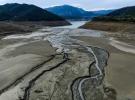'Finally': In Potential Nod To Biden Win, Federal Reserve Applies To Join Climate Network for Central Banks.
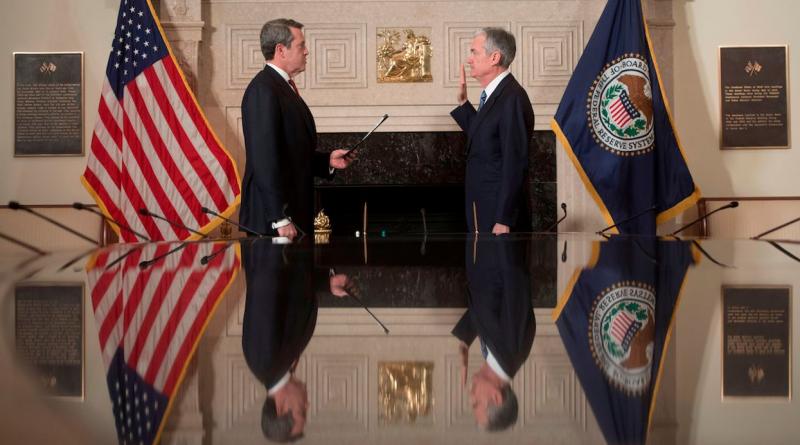
In a decision seen by some as a subtle acknowledgement of President-elect Joe Biden's victory even as President Donald Trump still refuses to concede, the Federal Reserve has applied to join what Bloomberg called "the climate change club for central banks," a group that requires participation in the Paris climate agreement.
"We have requested membership. I expect that it will be granted," Fed Vice Chair for Supervision Randal Quarles said during a Senate Banking Committee hearing Tuesday, Bloomberg reported. Quarles added that the Fed may become a member of the Network for Greening the Financial System (NGFS) before its annual meeting in April.
Launched in late 2017, the NGFS sets out to bolster the world's efforts to meet the goals of the Paris agreement and "to enhance the role of the financial system to manage risks and to mobilize capital for green and low-carbon investments in the broader context of environmentally sustainable development," according to its website.
The primary goal of the Paris deal, which took effect in 2016, is to "strengthen the global response to the threat of climate change by keeping a global temperature rise this century well below 2 degrees Celsius above pre-industrial levels and to pursue efforts to limit the temperature increase even further to 1.5 degrees Celsius."
Just over a year ago, the Trump administration began the one-year process of withdrawing the United States from the agreement; the U.S. exit became official last week, the day after the general election. While Biden has vowed to rejoin the deal, progressives around the world are urging him to go far beyond that and serve as a #ClimatePresident.
Bloomberg's Akshat Rathi suggested on Twitter Wednesday that by seeking NGFS membership, "the Fed tacitly accepts that Biden has won the presidency."

Although Biden's win may be a factor, earlier this year, before the U.S. officially ditched the Paris agreement, Fed Chairman Jerome Powell suggested the country could join the NGFS, Newsweek noted Wednesday.
"We have been looking at joining in one form or another and talking to them about that," Powell said in late January. "We probably will do that at some point."
According to Newsweek:
Powell's remarks led to some speculation the Trump administration might alter its approach to climate change, with the Financial Times reporting on January 31 that some at the Fed had been privately pushing for membership of the banking group.
"The Fed's interest is another sign of the importance of the work of the NGFS," Bank of France governor François Villeroy de Galhau told the FT at the time. "It's a coalition of the willing. Climate risk is clearly a part of financial risk."
Quarles' comments about NGFS membership came a day after the Fed formally acknowledged for the first time that climate change potentially threatens the stability of the financial system and urged banks "to have systems in place that appropriately identify, measure, control, and monitor all of their material risks, which for many banks are likely to extend to climate risks."
"The Federal Reserve is evaluating and investing in ways to deepen its understanding of the full scope of implications of climate change for markets, financial exposures, and interconnections between markets and financial institutions," the central bank said in its semiannual report on financial stability.
Politico pointed out that the report followed related comments by Powell and was welcomed by another key leader at the Fed:
Powell said last week that the "science and art" of incorporating climate change into financial regulation is new but that the Fed is "very actively in the early stages" of getting up to speed and working with officials around the world.
"I welcome the introduction of climate" into the semiannual report, Fed Governor Lael Brainard, who heads the central bank's financial stability committee, said in a statement. "A lack of clarity about true exposures to specific climate risks for real and financial assets, coupled with differing assessments about the sizes and timing of these risks, can create vulnerabilities to abrupt repricing events."
Alan Zibel, research director of Public Citizen's Corporate Presidency Project, which focuses on corporate influence and conflicts of interest in the Trump administration, also praised the Fed's inclusion of climate risk in the analysis but noted that it "is a latecomer to this party and is still propping up the oil industry (and other giant corps) through huge purchases of debt."
Public Citizen, Friends of the Earth, and BailoutWatch released a report in late September titled Big Oil's $100 Billion Bender that showed "how the U.S. government provided a safety net for the flagging fossil fuel industry." The report said the Fed's emergency financing during the Covid-19 pandemic is "forestalling the demise of an industry that has always relied on government largesse."
Last month, as Common Dreams reported, Sen. Jeff Merkley (D-Ore.) introduced legislation to prevent banks and international financial institutions from financing fossil fuels. David Arkush, director of Public Citizen's Climate Program, declared that he "is showing real leadership by introducing the first-ever bills to cut the money pipeline fueling the climate crisis."
When unveiling the pair of bills, the senator referenced a September report from the Commodity Futures Trading Commission warning that the climate emergency endangers the U.S. financial system. In response to the report, Arkush said that "U.S. financial regulators have the authority to help mitigate the climate crisis, and they need to use it. The best way to protect anything from climate change, whether people in wildfire or flood zones or giant banks, is to stop climate change."
12 November 2020
EcoWatch

